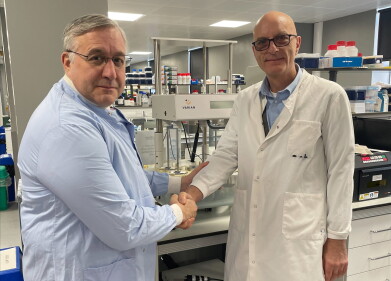News
£1.5m invested to develop imaging technology to improve animal research
May 09 2014
Research funding of 1.5 million has been awarded to develop advanced imaging technologies, to maximise their potential to reduce animal use in a diverse range of preclinical research applications.
The funding will support five research projects to increase the utility of a broad spectrum of imaging techniques, including bioluminescence, radio labelling and implantable technology. The projects aim to extend the use of imaging technologies in applications not currently possible with a view to improving animal research, for example by using non-invasive imaging, which minimises suffering, or longitudinal imaging throughout the study, which reduces the number of animals required.
The strategic funding from the National Centre for the Replacement, Refinement and Reduction of Animals in Research (NC3Rs), in collaboration with the Engineering and Physical Sciences Research Council (EPSRC), follows the identification of eight key technology challenges by leading researchers in the imaging field, which once overcome will enable preclinical imaging to both meet the needs of the bioscience sector and impact on the 3Rs.
Included in the funding is a project at the University of Nottingham that will utilise near-infrared quantum dots, a type of fluorescent marker, to improve sensitivity and resolution when imaging cancer cells in mice. The technology would overcome the current difficulties associated with imaging at a deep-tissue level, and enable repeat imaging of the same animal over time.
Researchers estimate that the refined pre-clinical cancer models made possible by this new imaging technique could reduce animal use in cancer studies by approximately 170,000 per year.
Dr Vicky Robinson, Chief Executive of the NC3Rs, said:
"This strategic funding allows the NC3Rs to target key areas identified by the research community where the development and application of new imaging techniques could have a profound impact on animal use and science."
Professor Philip Nelson, Chief Executive of the EPSRC, which co-funded £500k of the funding call, said:
"We are delighted to support the NC3Rs. This research builds on our previous collaboration in mathematical modelling in toxicology as well as drawing on and advancing the UK's first class capability in imaging technologies."
Digital Edition
Lab Asia 32.2 April
April 2025
Chromatography Articles - Effects of small deviations in flow rate on GPC/SEC results Mass Spectrometry & Spectroscopy Articles - Waiting for the present to catch up to the future: A bette...
View all digital editions
Events
Apr 09 2025 Tokyo, Japan
Apr 22 2025 Hammamet, Tunisia
Apr 22 2025 Kintex, South Korea
Analytica Anacon India & IndiaLabExpo
Apr 23 2025 Mumbai, India
Apr 23 2025 Moscow, Russia



















